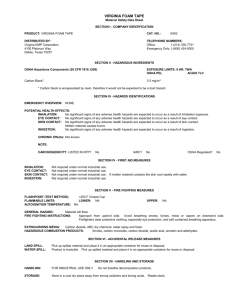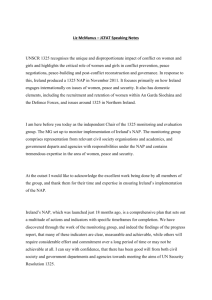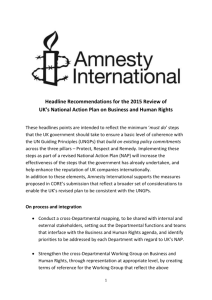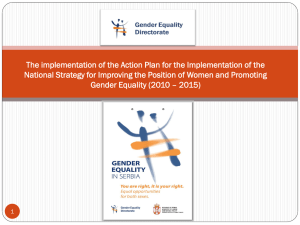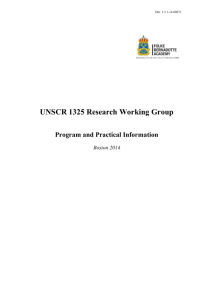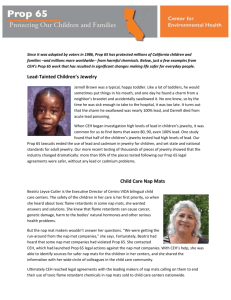here
advertisement
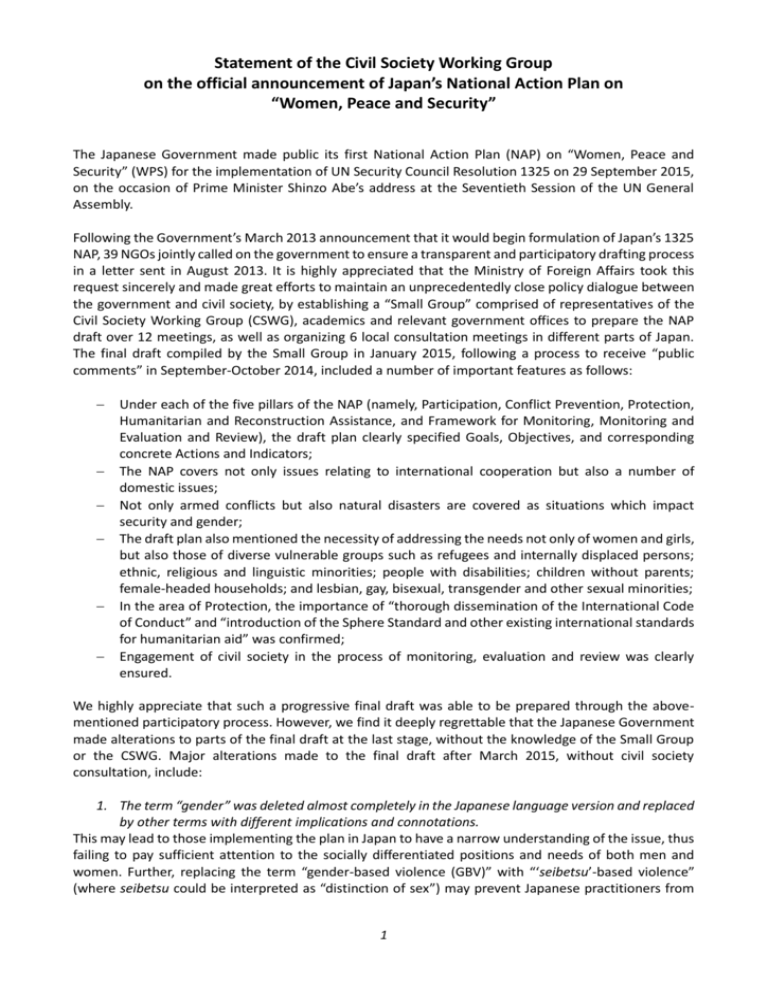
Statement of the Civil Society Working Group on the official announcement of Japan’s National Action Plan on “Women, Peace and Security” The Japanese Government made public its first National Action Plan (NAP) on “Women, Peace and Security” (WPS) for the implementation of UN Security Council Resolution 1325 on 29 September 2015, on the occasion of Prime Minister Shinzo Abe’s address at the Seventieth Session of the UN General Assembly. Following the Government’s March 2013 announcement that it would begin formulation of Japan’s 1325 NAP, 39 NGOs jointly called on the government to ensure a transparent and participatory drafting process in a letter sent in August 2013. It is highly appreciated that the Ministry of Foreign Affairs took this request sincerely and made great efforts to maintain an unprecedentedly close policy dialogue between the government and civil society, by establishing a “Small Group” comprised of representatives of the Civil Society Working Group (CSWG), academics and relevant government offices to prepare the NAP draft over 12 meetings, as well as organizing 6 local consultation meetings in different parts of Japan. The final draft compiled by the Small Group in January 2015, following a process to receive “public comments” in September-October 2014, included a number of important features as follows: Under each of the five pillars of the NAP (namely, Participation, Conflict Prevention, Protection, Humanitarian and Reconstruction Assistance, and Framework for Monitoring, Monitoring and Evaluation and Review), the draft plan clearly specified Goals, Objectives, and corresponding concrete Actions and Indicators; The NAP covers not only issues relating to international cooperation but also a number of domestic issues; Not only armed conflicts but also natural disasters are covered as situations which impact security and gender; The draft plan also mentioned the necessity of addressing the needs not only of women and girls, but also those of diverse vulnerable groups such as refugees and internally displaced persons; ethnic, religious and linguistic minorities; people with disabilities; children without parents; female-headed households; and lesbian, gay, bisexual, transgender and other sexual minorities; In the area of Protection, the importance of “thorough dissemination of the International Code of Conduct” and “introduction of the Sphere Standard and other existing international standards for humanitarian aid” was confirmed; Engagement of civil society in the process of monitoring, evaluation and review was clearly ensured. We highly appreciate that such a progressive final draft was able to be prepared through the abovementioned participatory process. However, we find it deeply regrettable that the Japanese Government made alterations to parts of the final draft at the last stage, without the knowledge of the Small Group or the CSWG. Major alterations made to the final draft after March 2015, without civil society consultation, include: 1. The term “gender” was deleted almost completely in the Japanese language version and replaced by other terms with different implications and connotations. This may lead to those implementing the plan in Japan to have a narrow understanding of the issue, thus failing to pay sufficient attention to the socially differentiated positions and needs of both men and women. Further, replacing the term “gender-based violence (GBV)” with “‘seibetsu’-based violence” (where seibetsu could be interpreted as “distinction of sex”) may prevent Japanese practitioners from 1 recognizing the need for prevention of and protection from violence based on the internationally shared understanding of the social causes of sexual violence. 2. The role of civil society in the monitoring and evaluation process became less clear. For example, it must be ensured that the replacement of the term “civil society” with “experts (including representatives of civil society and NGOs)” will not restrict participation of the wider civil society, especially grassroots women’s organizations in light of the purpose of UNSCR 1325. 3. Reference to the responsibility of Japan in relation to the past war, including wartime sexual violence, was deleted from the Preamble. The CSWG proposed that the Japanese NAP should clearly state in its Preamble recognition of and remorse over the fact that Japan caused mass-scale violence against women during its past colonial rule and military aggression, affirming that such recognition and remorse should be a prerequisite for Japan to prepare its NAP on Women, Peace and Security. Even the single phrase in relation to this which remained in the draft for public comment, the tone of which had been considerably weakened during negotiations with the Japanese Government, was eventually removed from the final document. 4. Other items deleted from the final draft are as follows: - Prevention: an Action against “hate speech” based on race and gender in Japan; - Protection: Actions addressing sexual violence committed by foreign armed forces stationed in Japan; - Protection: An indicator on support to GBV victims for access to legal justice. In the field of international cooperation, comprehensive support for GBV victims should cover medical, economic and legal support. Lack of access to legal justice may prevent victims from recovering from the stigma, putting the blame on victims and rendering access to other services more difficult. The Japanese Government should fully implement the NAP in consultation with civil society both in Japan and overseas, while following international discussions on the WPS agenda, such as the outcome of the High-level Review of UNSCR 1325 at its 15th anniversary in October 2015. We, as civil society, will also actively engage in monitoring implementation of the NAP, as well as in the evaluation and revision process, pursuing realization of the principles and goals of UNSCR 1325 on WPS. With regard to the process, we request the following of the Japanese Government: To ensure civil society participation in the monitoring, evaluation and revision processes, in a transparent and accountable manner. In particular, the nature and detailed activities of the Evaluation Committee should be considered and decided upon in consultation with civil society. To implement the NAP in line with international standards, reflecting the latest discussions and developments in the field of WPS. To implement the NAP according to the original aspirations and international standards regarding gender, even if the term “gender” is not used in the Japanese language version. Issues deleted in the final document of the NAP to be reconsidered in the revision process, taking into account the discussions which took place during the drafting process. 18 November 2015 Civil Society Working Group on UNSCR1325 NAP Japan 2

